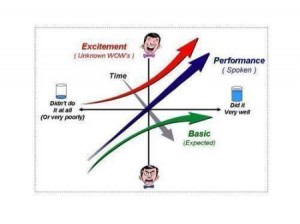Why Six Sigma Fails Detroit
Michigan desperately needs innovation to be competitive. When Japan started using Statistical Process Control (SPC) now known as Six Sigma, it was a competitive differentiator. In other words Japanese auto makers used quality and lean process as an innovation. Detroit has been feverishly implementing Six Sigma but they are still losing ground to the Japanese and now the Koreans and soon to be China. Why?
Six Sigma is a great thing but doing it as a “me-too”? only creates commoditization. Worse yet, the entire process of Six Sigma is about doing the same thing cheaper and cheaper. That leaves you in a death spiral to the lowest priced product, and little or no profits. Does that sound familiar?
Detroit, Michigan and the USA in general need innovation. Everyone knows that but almost no one is really doing it. The main reason is they don’t know how. What if innovation could be as predictable and systematic as Six Sigma? What if a company could create practical, profitable innovations on demand? Does that sound fantastic? Impossible?!? It is fantastic and it’s absolutely possible.
Predictive Innovation makes innovation:
- Efficient
- Low-Risk
- Controllable
- Repeatable
- Competitive
- Reliable
- Just-In-Time
Rather than looking at innovation as a magical creative activity it uses the very well defined study of System Theory and new breakthroughs in Information Theory to create a step-by-step process for innovation. How systematic is it? How about knowing there are 7 specific elements to innovate in any product or service and there are 15 types of alternatives for each element? When you realize that, you are guaranteed 105 innovations targeted precisely to your business needs and your customer’s desires.
When you use Predictive Innovation you can create an innovation strategy that causes your profit margins to increase overtime, risks to decrease and eliminate the threat of any competition.
Predictive Innovation has been used to create entire families of products, increase the value of investments, and solve seemingly impossible problems. It’s been applied to manufacturing, software, medicine, marketing, security, business strategy, politics, and entertainment.
Make a Killing With Unprofitable Ideas.
 The most valuable idea you can find might be the one that you can’t profitably market. Have I totally gone out of my mind? Has all this talk of abundance and things being free and eliminating jobs being a good thing rotted my brain? No, not in the slightest! For once I’m going to tell you a way to succeed in a scarcity environment. I’m even going to tell you how to fight dirty and DESTROY YOUR COMPETITION. No I’m not talking about some profound way of avoiding competition and embracing each other to become friends. I mean wipe out, nuke, obliterate, put out of business and just be mean nasty and underhanded.
The most valuable idea you can find might be the one that you can’t profitably market. Have I totally gone out of my mind? Has all this talk of abundance and things being free and eliminating jobs being a good thing rotted my brain? No, not in the slightest! For once I’m going to tell you a way to succeed in a scarcity environment. I’m even going to tell you how to fight dirty and DESTROY YOUR COMPETITION. No I’m not talking about some profound way of avoiding competition and embracing each other to become friends. I mean wipe out, nuke, obliterate, put out of business and just be mean nasty and underhanded.
You’ve created a fabulous product. Your marketing has connected with customers that stand in line to buy your great new product. The profits are rolling in. You make plans to expand and crank out more of your product to meet the ever-increasing demand. Life is great.
So there you are driving your new super luxury convertible when you hear on the radio that someone figured out a way to do exactly what your product does for 1/10th the price of your product with something just about everyone can get in any store. You spit your double latte half-caff espresso all over the windshield and nearly run off the road. In utter disbelief you shout, “how is that possible!?!” You can’t even buy the raw materials to make your product for that price.
When you get to your office and try to verify what you heard on the radio you get the call. Your largest distributor just canceled that multi-million dollar order. That is when it hits you; instead of spending 3 weeks on a cruise you will be begging investors and bankers for help to avoid bankruptcy.
That is why you need to discover unprofitable ideas. If you had known this was possible you never would’ve risked so much. You would have found a different product and you would’ve been prepared. When you come up with your great innovation you need to uncover all the competition. Competition might not be another business. It might be the next great idea just around the corner. Sometimes the worst competition is your own customers. If your customers suddenly don’t need your product, you’re business is dead.




 Predictive Innovation Training
Predictive Innovation Training Predictive Innovation: Core Skills Book
Predictive Innovation: Core Skills Book RoundSquareTriangle.com
RoundSquareTriangle.com